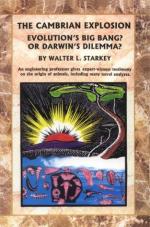|
This section contains 779 words (approx. 3 pages at 300 words per page) |

|
The Cambrian Explosion, known informally as Biology's Big Bang, refers to the event that greatly increased the variety of animal species and created the major types of animals that exist today. Scientists refer to this event as an "explosion" not because it was a period of violent activity, but because an incredible amount of evolutionary activity occurred in a relatively short length of time. This burst of evolution occurred during the early years of the Cambrian period (approximately 570 million to 495 million years ago). The Cambrian Explosion ran its course over several tens of millions of years, but this time period is quite brief considering the length of time that multicellular life has existed on Earth (about 600 million years).
 Study of fossils provided the information to create this chart.
Study of fossils provided the information to create this chart.
In addition to the phyla that are still present today (phyla Porifera [sponges], Cnidaria [jellyfish], Platyhelminthes [flatworms], Nematoda...
|
This section contains 779 words (approx. 3 pages at 300 words per page) |

|


